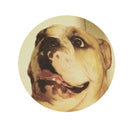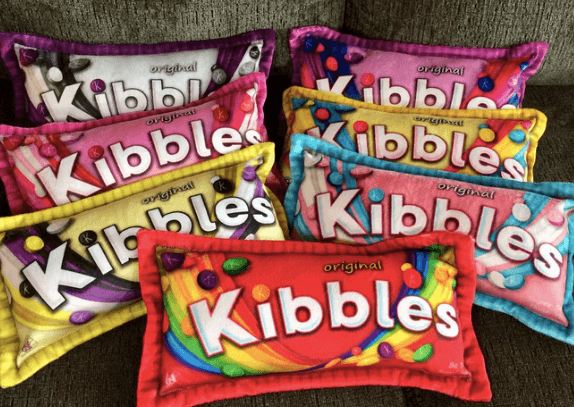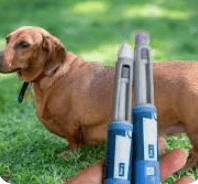Candy and kibble have way more in common than they should. Kibble is primarily owned by MARs Inc, Nestle Purina, Colgate and Hill's, with MARs owning the most of the market. MARs Inc monopolizes the vet business and candy and kibble have way more in common than they should, which include ingredients.
A monopoly occurs when one company and its products dominate an entire industry and there is little to no competition. Consumers must purchase specific products or services from the one company. In the case of MARs Inc., they own the kibble, the vets, the hospitals, the vaccines, the medication, the labs and the diagnostic testing and keep acquiring more and more. They can basically get away with anything because they control the entire industry. They can use the same ingredients in candy as the do kibble because kibble companies are a huge business. And just like any business the goal is profit and not the health of your animal.
Candy and kibble are made by MARs Inc., a sugar company and have way more in common thay they should. This is the same company that manufactures M&M's, Twix, Skittles, 3 Musketeers, Orbit Gum, Dove chocolate, Juicy fruit, Lifesavers, Snickers and Starbursts, to name a few, is the same company that makes the most popular brands of kibble including Eukanuba, Greenies, Iams, Orijen, Pedigree, Royal Canin and many, many more. Candy and kibble have way more in common than they should.
Candy and kibble also typically contain "natural flavors," which according to FDA regulations, are create from substances extracted from the following plants or animal sources listed below and are manipulated in a lab.
- spices
- herbs
- vegetables or vegetable juice
- edible yeast, herbs, bark, buds, root leaves, or plant material
- dairy products, including fermented products
- meat, poultry, or seafood
- eggs
Natural flavors add ZERO nutritional benefit and are used to increase palatability. Any food that has been manipulated in a lab to make a product taste better is undoubtedly a food a human or a dog would otherwise not even consider eating.
In addition to natural flavors, most kibble contain actual by-products from the candy industry, like dried beet pulp, which are fibrous flakes that come from sugar beets after the sugar extraction process. Just like natural flavors, beet pulp is highly palatable, but does not mean it actually has any nutritional benefit. Candy and kibble have way more in common than they should.
Just like candy, kibble is very high in sugar, regardless of how it is marketed and packaged. Kibble that contains grains like corn, wheat, rice, other starchy vegetables like potatoes, or dried beet pulp are high in sugar despite claims. Just like humans, when a dog eats sugar, dopamine is released, which is a "feel-good" hormone. However, the more sugar that is consumed, the less dopamine is released and the consumption of more sugar is needed to achieve the same happy feeling. Dogs are not naturally grain-eaters. Eating a diet high in carbohydrates combined with a lack of exercise will create insulin resistance, which is linked to every single metabolic disease there is.
According to this article, "not only does up to 50% sugar in kibble attract your dog's palate, most pet food manufacturers need 'sticky' ingredients to manufacture their foods and maximize profit. Every traditional kibble type (and most other pet foods) contains an ingredient that dogs don't need. It's not only in the food to save money, it's in the food because they can't create the food without it."
MARs Inc. and companies like it including Purina and Hill's also sponsor vet schools. The Pet Food Program from UC Davis, which allows members, residents, faculty and students receive pet food from brands like Hill and Royal Canin at heavily discounted prices. Purina also funded the Nutrition Centers at Tufts University Foster Hospital for Small Animals, Michigan State University, Colorado State University (Read more on that here). This makes attaining an unbiased veterinary education very difficult, if not impossible. To be clear, vets are not the problem here. Most are well-intentioned and work very hard, it's the kibble companies that are at fault here.
Some big-name veterinary hospitals, clinics and diagnostics they own in the United States include Anicure, Amtech Diagnostics / Sound, Banfield, Blue Pearl, Mount Pleasant Veterinary Group and the VCA Animal Hospitals.
They recently acquired Heska, a veterinary diagnostic group for $1.3 billion. You can read the press release here. And now, they are about acquire SYNLab Vet, a European Veterinary Reference Laboratory. You can read more on this acquisition here.
So let's get this straight: The company that manufactures candy, also manufactures most of the popular kibble brands, owns most of the popular animal hospitals and local vets), sponsors many vet schools and owns diagnostic testing too. They also use the left over by-products of candy to manufacture kibble. Some examples of these ingredients include sugar beets and dried bakery products. Again, candy and kibble have way more in common than they should.
This is unethical, but anything goes in the vet biz. This is because businesses are about profit, and not keeping animals alive or well. Monopolies like MARs Inc. are the dog food guys that fund vet schools and work with the vaccine guys to make laws on what is legal and approved. The dog food guy is also besties with the vet board guy because that guy is also funded by the vaccine guy. This is the equivalent to fast-food owning the nutritional information your doctor gets. Oh wait, this happens too!
So who cares? What is the big deal?
The big deal is that our animals are getting sicker and fatter. It is estimated that 65% of the dogs in the UK and USA are overweight or obese. Obesity and disease rates are skyrocketing and is accepted as normal, when it is anything but. Dog genetics haven't changed, but their environments have. The food they eat, the vaccines they get and the medical care that they receive are the culprits.
And companies like the constantly expanding MARs Inc., the keeper of all things animal care, actually do not care about your animal, despite genius marketing. The more businesses they acquire within the animal sector is a loss for the rest of us trying to keep our animals alive and thriving, not fat and sick. Candy and kibble have way more in common than they should.
If you want to get your dog off of the merry-go-round of sickness and disease start by feeding a high quality diet made of protein, veggies and fruit that most closely resembles what they would eat in the wild. Please click here to learn more about what to feed your dog. If your dog is sick and you need some guidance on helping them feel better, please visit Bobzilla's Happy, Healthy Life Made Simple.
$5.00
The veterinary business is business which is not in the business of curing your animal, but Bobzilla's business is. Bobzilla is committed to one hundred percent transparency in all of its scientific research into animal wellness and prevention of disease and one… read moreDonate to Bobzilla.org



